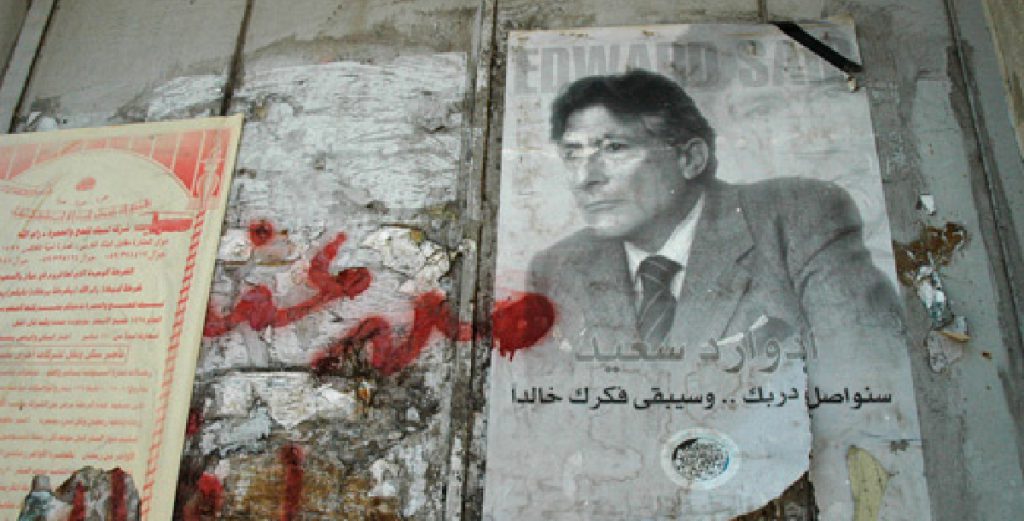Every place that enjoys academic freedom owes its existence to practices developed in all parts of the world. Markus Holdo asks whether, in the midst of Israel's destruction of Palestinian academic institutions, we can rediscover what Edward Said once described as the utopia of a free university
Four years before he died, Edward Said walked up to a podium at the American University of Cairo to give a commencement speech to the class of 1999. He thanked his hosts, commented on the significance of higher education in the Middle East, and assured the audience that no matter how complicated and confusing it is to be a student, 'it’s certainly a lot more fun than working'.
He then delivered a speech that 25 years later feels remarkable to read as students protest around the world in solidarity with Palestine.
'In every known society', he said, 'from the ancient Near East, the Arab world to China, India, Greece, and elsewhere – the academy, as Plato called it, was a protected, almost utopian place.'
In that place, where governments, bureaucracies, secret services, and interest groups had no authority, students could learn freely together, act on their curiosity, and see where it would lead them.

Universities were, of course, no more innocent in Edward Said’s time than they are today. Said’s most widely read book, Orientalism, was an extensive critique of Western academic works that had served imperialistic projects by constructing 'the Orient' and 'the Orientals' as inferior.
Said studied at Princeton and Harvard, and became a Professor at Columbia. At each of these institutions, he had at best felt like a 'puzzling anomaly', as he puts it in his memoir, Out of Place. At worst, he was treated as a dangerous character. A right-wing magazine dubbed him a 'Professor of Terror' in response to his critique of Israel’s occupation of Palestine.
Said saw the university as a potentially liberating place
Nevertheless, Said saw the university as a potentially liberating place. For people who have made education their life, there will always be, he said, a 'genuine aura surrounding the academic and intellectual enterprise'. There will also always be, he added, 'a sense of violated sanctity' whenever 'the university or school is subjected to crude political pressures'.
But the university could only be a special place if treated as such, Said argued. What did this mean? Plato famously built his Academy outside the city walls of Athens and warned not to let anyone enter who did not possess a pure love for knowledge. Said, too, wanted the university to be free.
Said recognised that all academic institutions are shaped by history and political contestation
But unlike Plato, Said recognised that history and political contestation shape all academic institutions. Arab universities, not least Palestinian institutions like Birzeit and al-Najah, must embrace the decolonial struggle of which they are part, he argued. Nor should Western universities train students to become neutral observers who disengage from what is happening in the world.
On the contrary, Said argued that the university’s challenge is to act in the world based on its core values: to 'enter a ceaseless quest for principles and knowledge, liberation, and finally justice'.
Said insisted that all students and teachers play a role in this quest. After all, the work of scholars such as George Makdisi had taught us that the university’s history belongs to everyone.
People came together in the Arab colleges, madrasas, in the mosques and courts of Iraq, Sicily, Egypt, and Andalusia, centuries before the first West European universities were founded. The European humanist tradition got some of its most important insights, particularly about the conditions that allow students and teachers to produce knowledge, from these places.
'There isn’t a single source for anything', Said concluded. 'All peoples share in the making of history, all peoples make history'. We must therefore enter this ceaseless quest recognising each other as equals.
Today, I read Said’s words at a time when the university has lost credibility in the eyes of many students. Even teachers, myself included, have begun wondering what it really stands for.
Israel has destroyed all institutions of higher education in Gaza and killed thousands of students and teachers. Our Palestinian colleagues ask that we show solidarity and defend the right to education in Palestine. While some European universities have done this, many have declined.
Our Palestinian colleagues ask that we show solidarity and defend the right to education in Palestine
At the US institutions where Said studied and worked, students are protesting, but boards and presidents refrain from condemning or criticising Israel. The university where I work has taken the same stance. So, apparently, has the Executive Committee of the European Consortium of Political Science. They have all declared themselves 'neutral' regarding the demolition of academic freedom in Palestine.
But places of academic exploration have never been fully controlled by university presidents, boards, and executive committees. As Said reminded us, the history of higher education was made by students and teachers everywhere. Its future will be, too.
A few weeks ago, I saw a picture of a student holding a sign that read: 'Columbia, why require me to read Prof Edward Said if you don’t want me to use it?' They were right, of course. It’s up to all of us to seize this moment and rediscover what it means to practice the utopia of a free university.
⛓️ No.9 in a Loop series examining constraints on academic freedom in a variety of global contexts